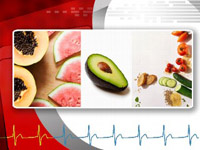Right Nutrition May Help to Avoid Cardiovascular Disease
Adopting healthy eating habits is one way to reduce the risk of developing heart disease and stroke, scientists believe.

The American Heart Association gives a number of recommendations concerning nutrition for those potentially affected by heart diseases:
- Choose lean meats and poultry without skin and prepare them without added saturated and trans fat.
- Select fat-free, one percent fat or low-fat dairy products.
- Cut back on foods containing partially hydrogenated vegetable oils to reduce trans fat in your diet.
- Cut back on foods high in dietary cholesterol. Aim to eat less than 300 mg of cholesterol each day.
- Cut back on beverages and foods with added sugars.
- Choose and prepare foods with little or no salt. Aim to eat less than 2,300 mg of sodium per day. Anyone with hypertension, all middle-aged and older adults should consume no more than 1,500 mg of sodium per day.
- If you drink alcohol, drink in moderation. That means no more than one drink per day if you're a woman and two drinks per day if you're a man.
- Keep an eye on your portion sizes.
As part of a healthy diet, an adult consuming 2,000 calories daily should aim for:
- Fruits and vegetables: At least 41Ú2 cups a day
- Fish (preferably oily fish): At least two 31Ú2-ounce servings a week
- Fiber-rich whole grains: At least three 1-ounce-equivalent servings a day
- Sodium: Less than 1,500 mg a day
- Sugar-sweetened beverages: No more than 450 calories (36 ounces) a week
Other nutrition measures:
- Nuts, legumes and seeds: At least four servings a week
- Processed meats: No more than two servings a week
- Saturated fat: Less than 7 percent of total energy intake
Be sure to eat a wide variety of nutritious foods daily. As always, small changes in lifestyle can make a big difference in improving your overall health.
News-Press com. has contributed to the report.
Subscribe to Pravda.Ru Telegram channel, Facebook, RSS!





